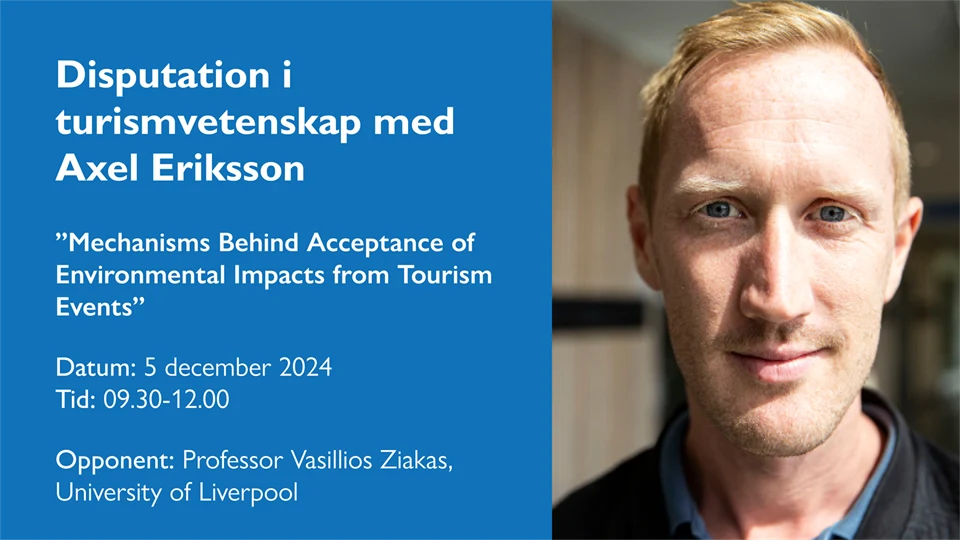Dissertation in Tourism Studies with Axel Eriksson
Welcome to a dissertation in tourism studies where Axel Eriksson defends his thesis "Mechanisms Behind Acceptance of Environmental Impacts from Tourism Events".
Date: Thursday, December 5
Time: 09:30-12:00 followed by mingle and refreshments
Location: Room F234, campus Östersund and via ZOOM
After the dissertation, we invite you to mingle and refreshments in the foyer (F218). Registration for the mingle and refreshments closed on 2 December.
The public defence will be held in English.
Supervisor
Associate Professor Robert Pettersson, Mid Sweden University
Assistant supervisor
Associate Professor Sandra Wall Reinius, Mid Sweden University
Opponent
Professor Vasillios Ziakas, University of Liverpool
Examination Board
Professor Reidar Mykletun, University of Stavanger
Associate Professor Marianna Strzelecka, Linnaeus University
Professor Ingrid Zakrisson, Mid Sweden University
About the thesis
Few other tourist activities attract large crowds to a specific area for a short period of time like events. Actors such as local residents and organizers still seem to accept events despite its environmental impact. However, the social and cultural mechanisms behind this acceptance are not known in research. By understanding these mechanisms, we can explain how actors are reshaping their acceptance of tourism products despite the ongoing Anthropocene.
The aim of this thesis is to increase the understanding of the acceptance of the environmental impact of tourism activities. This is done by shifting the focus from general environmental impacts, such as emissions, to the local impact on nature, such as wear and tear on land and trails during nature-based events. The empirical data is based on qualitative field studies with interviews, observations and document analysis conducted in the Jämtland countryside. Four actors are highlighted in a compilation of studies in four articles: the regional county administrative board that issues permits for nature-based events, local actors who live and work in the areas around these events, and event organizers and participants who use trails as a resource for their activities. The analytical framework draws on post-development theory to challenge established previous research and conventional frameworks to explain tourism development. This lens can illustrate how acceptance is reshaped through a dynamic use of resources among several actors.
Five central mechanisms that reshape acceptance have been identified. One mechanism shows how actors reshape their acceptance of damage to nature by relating it to a global context. A second mechanism shows how the actors see the growth by decoupling the impact from events and tourism, where the actors do not reflect on the cumulative effects that arise in connection with all tourism activities in the area. A third mechanism shows three types of ownership that affect acceptance: ownership linked to social responsibility, a national context, or economic interests. A fourth mechanism highlights how the actors transfer their responsibility to minimize impact to other actors, where acceptance arises by distancing themselves from the chain of responsibility and the local context. Finally, a fifth mechanism shows how acceptance is tied to how boundaries are shifted when the event is integrated into a wide range of different activities. The main argument of the thesis is that the acceptance of physical impacts on nature from events depends on the actors' willingness to adapt to others. When the events are closely linked to a diversity of different tourism actors and other stakeholders in the area, it promotes acceptance even if it affects their future and everyday lives.
